Fantastic Mr. Fox
I grew up with Roald Dahl's books as they came out when I was just the right age to appreciate them as fantasy stories, not too young for the wonderful prose and poetry to go over my head or be particularly frightened by the darker elements (of which there are many) so the likes of The Twits, James and the Giant Peach and The Witches formed the backbone of my bedtime stories.
It seems that Dahl was a little bit ahead of his time as his books were perfectly written as the basis for a film screenplay so it is no surprise that most of his novels have been turned into feature films with varying degrees of success. The latest of these is (another) animated adaptation of one of his best loved books, this time Fantastic Mr. Fox. The screenplay was written by frequent collaborators Wes Anderson and Noah Baumbach and is a stop motion animation film. James and the Giant Peach was also animated as that is a terrific medium to get into the intricacies of Dahl's extremely imaginative and otherworldly prose.
In the case of Fantastic Mr. Fox, some liberties have been taken with the source material and the film stays fairly faithful to Dahl's novel, including all of the main characters, but Anderson and Baumbach have introduced some new ones and some new scenarios in order to turn a fairly brief novel into a feature length film (which itself is fairly brief at just over 80 minutes). The film follows Mr. Fox, who gets by as a chicken (and other related poultry) thief but, when he and his pregnant wife are caught in a trap, she makes him give up this dangerous lifestyle so he becomes a columnist for the local newspaper. Chicken rustling is an itch that just won't go away so, having moved from his underground den to a fairly spacious tree by the river, Mr. Fox enlists the help of one of his new friends, a strange possum with a knack for catching minnows, to pull off one last big job.
This 'one last big job' is actually three jobs as it entails breaking into the farms of the local chicken, cider, pâté and smoked meat suppliers, Boggis, Bunce and Bean (one fat, one short one mean, as the local children's rhyme goes). Having relieved the three men of most of their produce and somehow managed to keep his wife's suspicions as just that, nothing more, Mr. Fox decides that there is no reason to stop. Unbeknownst to him, the three farmers are out for blood and, when shooting at their vulpine foe fails, only separating Mr. Fox from his tail, they resort to heavy machinery, digging out the tree and then, when that fails to snag the elusive thief, they turn to high explosives.
Whilst all this is going on, Mr. Fox's son, Ash, is having problems with his self esteem as his father was such a great athlete and whack-bat player that he is always compare to him and, when his cousin, Kristofferson, shows up as a brilliant whack-bat player, terrific athlete and a real ladies man, his ego takes a further dent.
As a massive fan of Wes Anderson's films, I thought this looked terrific from the trailer so went to see it at the cinema with extremely high expectations. I was far from enamoured with it then as it seemed to be more a Wes Anderson film than a Roald Dahl film and one that was aimed more at an adult audience than a children's one, being a little more 'knowing' than I was expecting. I felt that Anderson's brand of unusual humour would work perfectly with Dahl's own brand of the offbeat, surreal and wacky, but it just didn't. I was also little put off by the voice acting as there is a knack to striking the perfect balance between big name stars and their characters so the casting of George Clooney as Mr. Fox felt like a homage to his role in the Ocean's 11 (and its sequels) film as he gathers a group of strange individuals with their own specialties, with him as the brains of the operation. Certainly, Wes Anderson has surrounded himself with familiar collaborators such as Bill Murray, Owen Wilson and Jason Schwartzman and they all have distinctive voices so, even watching it, I got the impression that this was a little bit of a reunion for Anderson and his friends.
Some of the film works for me and it was terrific to see stop motion animation on the big screen, so it wasn't just Aardman Animation working with the painstaking process and you can even see the individual hairs move which proves to you that the animators were really moving the models many times each frame. There is also an interesting part of the screenplay, aimed squarely at adults, in which characters would say "cuss" where an expletive would normally be uttered.
There is plenty to admire in Fantastic Mr. Fox as it is a very ambitious project, and one that was painstakingly undertaken by the whole animation team, but one that, for me anyway, felt a little dull and flat. There were several occasions during the film where I was a little bored and wasn't, unlike when I read the book, taken into the whole environment and the world of Mr. Fox and his friends, family and enemies. It could be that the screenplay just didn't capture me in the same way that Dahl's book did or it could be that there is something about reading a book that leaves a great deal to the imagination so that my version of Fantastic Mr. Fox isn't the same as that imagined by Wes Anderson and Noah Baumbach.
The Disc
Extra Features
Sadly, no commentary by Wes Anderson or any other members of the cast and crew, so the principal extra feature is Making Mr. Fox Fantastic which is a multi-part Making Of documentary where the individual segments can be played individually or as one 45 minute featurette which unfortunately comes with a large copyright screen at the end of each section.
The Look of Fantastic Mr. Fox goes into the origins of Roald Dahl's story, how the character of the titular of vulpine is probably based largely on him, and goes in to our Wes Anderson became involved whilst looking at all of the 120 sets that were built.
From Script to Screen goes into the book and describes what a challenge it was to turn such a reasonably short novel into a feature length script.
The Puppet Makers is an interesting discussion with the animators and illustrates the immense amount of work it took to make the film using stop motion animation.
Still Life (Puppet Animation) expands on the previous piece by showing more of the animation process and features an interview with Wes Anderson in which he talks about how much he likes the stop motion process and why King Kong was such an influence on his decision to use this process.
The Cast goes into the work that the famous names put into in order to give their voices a bit more realism, such as George Clooney running on the spot so he really sounds out of breath when the character is.
Bill and His Badger is, without a doubt, the best of these six pieces as it follows Bill Murray walking around the animation studio, talking to the animators and, let's face it, seven minutes in Bill Murray's company is always gone to be worth a watch.
A Beginner's Guide to Whack-Bat should have been the most enjoyable and illuminating of all of the extra features but, at little over a minute, is a complete waste of time as it is little more than the explanation of the game given in the film.
Fantastic Mr. Fox: The World of Roald Dahl is an interesting three minute piece featuring Wes Anderson and Roald Dahl's widow where they talk about the inspiration for the film, Dahl's love of England and his 'writer's retreat' in his cottage's back garden and how this inspired Wes Anderson to set the film as he did.
There is also a selection of trailers for this and other Twentieth Century Fox Home Entertainment releases. The set also comes with a Digital Copy should you want to watch it 'on the go'.
n.b. All of these extra features are in high definition, which is really the way it should be.
The Picture
I hesitate to use the word 'flawless' as that infers that, in no way, there could be any improvement but I think it's the only word that fits here as there isn't a pixel out of place and the transfer is crystal clear. You can see every hair on the models' heads and make out every little bit of detail that went into creating the sets and models.
It is terrific to see stop motion animation in a big budget feature film and, with the armatures covered in fur, it takes you back to the days of Ray Harryhausen and Willis O'Brien, especially King Kong. As is pointed out in the extra features, a lot of detail went into ageing Mr. Fox as he begins the film with a full pelt bright orange hair but, as the film progresses, there is an increasing number of white hair in his coat.
I don't know whether the film would have had the same effect if it had been a CG animated movie or whether it had been a 2D hand drawn film using cell animation, but that is something you can only imagine as it will probably never happen.
The Sound
The DTS-HD Master Audio 5.1 track is beautifully clear, presenting the dialogue almost perfectly and, although the film is principally dialogue dominated and frontloaded, the rear surrounds I used occasionally for the more ambient and nuanced sounds and for the odd scene in which there is action, an explosion or a great deal of digging.
As with Wes Anderson's other movies, music plays a huge role and the score, by prolific composer Alexandre Desplat, is an extremely good one and there is even a role for former Pulp front man Jarvis Cocker who sings a song in the film plays the character Petey.
There is also an audio descriptive track plus English HoH subtitles to cater for the visually impaired and hard of hearing viewer.
Final Thoughts
I really wanted to like Fantastic Mr. Fox and have now given it two chances, one at the cinema and one at home and the fact that I was left feeling flat on both occasions means that the first one wasn't a fluke and, as it wasn't only me who didn't think much of it at the cinema, means that I'm not alone. I wasn't a great fan of Wes Anderson's previous film, The Darjeeling Express, so I'm not sure whether I'm slowly going off his films and his particular brand of leftfield humour, whether he is not a filmmaker he used to be or whether he is moving in a direction which I don't 'get' (I still love The Royal Tenenbaums, Bottle Rocket and The Life Aquatic with Steve Zissou).
There are bound to be plenty of people who will love this film and, if it persuades any children to read the book than that is surely a good thing as your imagination is always more potent than what a filmmaker can conjure up the studio. For those who liked the film at the cinema, this is a very good Blu-ray Disc and, if you like Wes Anderson's other films, then this is something worth at least a rental.
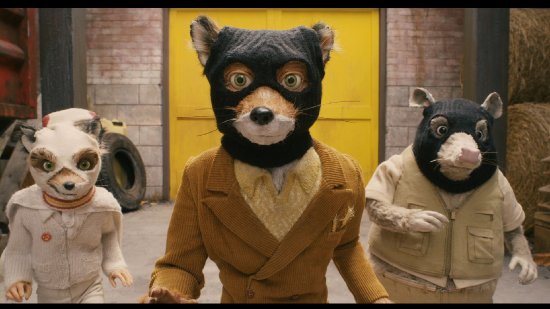
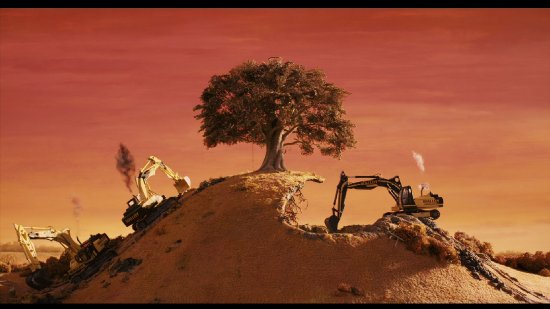
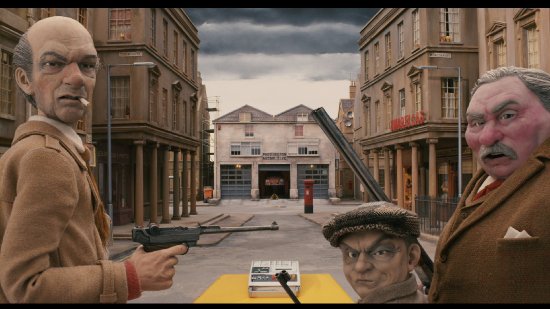
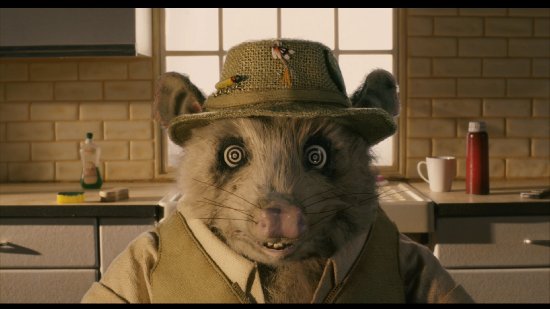
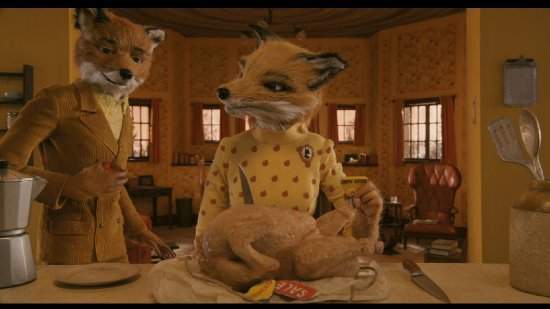
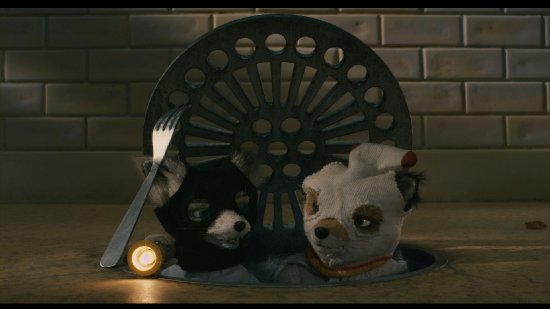
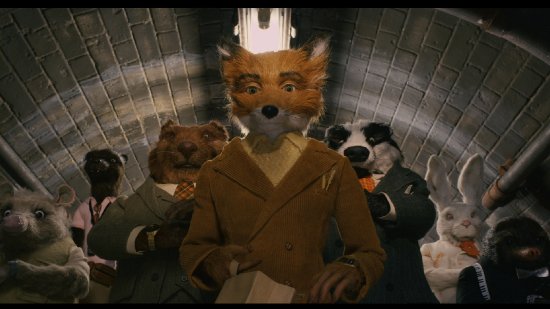
Your Opinions and Comments
Be the first to post a comment!